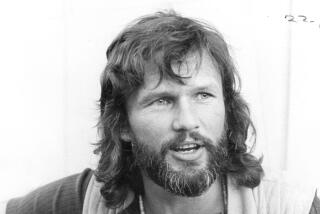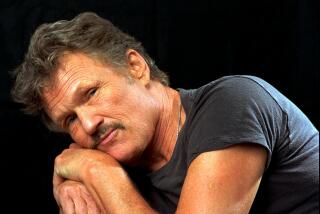Doctor, 61, joins Navy to honor son
- Share via
SAN DIEGO — When Marines came to his door a year ago to tell him that his eldest son had been killed in Iraq, Bill Krissoff reacted like any father: with confusion, devastation, then numbness.
Nathan Krissoff was so young, a lover of poetry, a champion athlete, a leader whose maturity and selflessness had impressed fellow Marines.
The father in Krissoff found no resolution to his grief. The physician in him did.
At an age when many people think about retirement, Krissoff decided earlier this year that he would enlist as a doctor. He was 60 years old, decades above the military’s preferred demographic.
Still, with a medical degree from the University of Colorado and specialty training at San Francisco General Hospital and UC Davis, Krissoff seemed easily qualified for a reserve commission in the Navy medical corps, which tends to Marines.
Krissoff had a flourishing private practice in Truckee, Calif. After a lifetime of swimming, kayaking and skiing, he was lean and fit.
But his age was a sticking point. His application bogged down in the military bureaucracy. He thought things might be hopeless.
Then, in late August, Krissoff and his wife, Christine, were invited to meet with President Bush after his speech to the American Legion convention in Reno.
At the end of the hourlong meeting, Bush asked Krissoff and other relatives of service members killed in Iraq and Afghanistan whether there was anything he could do for them. Krissoff mentioned his desire to enlist.
Karl Rove, then the president’s top political advisor, took notes. Once back at the White House, he turned the matter over to Marine Gen. Peter Pace, then chairman of the Joint Chiefs of Staff.
A few days later, Krissoff got a call from Lt. Cmdr. Ken Hopkins, a Navy nurse now on medical recruiting duty. With a push from the top, Krissoff’s enlistment application began to speed through the process of interviews and background checks.
“Suddenly, I got all the support I needed from the bureaucracy to get this done,” Hopkins said.
On Nov. 17, Krissoff, now 61, was commissioned a lieutenant commander in the Navy reserves, assigned to the medical corps. Rove sent flowers and a note of congratulations.
Because of the need for doctors and other health professionals, the military offers reserve commissions to qualified applicants.
It is not uncommon, Hopkins said, for civilian doctors at the top of the profession to look to the military for a new challenge. The commitment is light: a weekend a month and two weeks every summer.
But if a reservist wants to do more, the Navy is more than willing to put him or her on active duty at a base, a military hospital or a combat zone.
Several weeks of training in military-style medicine lie ahead, but Krissoff believes he is on his way to honoring his late son, 1st Lt. Nathan Krissoff, by deploying to a field hospital in Iraq.
He is closing up his orthopedic medicine practice in Truckee. He and his wife are moving to San Diego to be close to the Marine Corps 4th Medical Battalion.
They also will be near their other son, Austin, 24, a Marine officer at Camp Pendleton.
“I’m just a doctor who wants to help Marines; I’m not trying to change the world,” Krissoff said in a telephone interview. “I’m inspired by both my sons’ dedication to service.”
Nathan Krissoff, 25, an intelligence officer with the 3rd Reconnaissance Battalion, was killed Dec. 9, 2006, by a roadside bomb while riding in a Humvee outside Fallouja, west of Baghdad.
Hundreds of Marines, soldiers and sailors attended a memorial service for him in the auditorium at Camp Fallouja.
Even by the mournful standards of such events, the memorial was emotional. Marines hugged one another, and many had tears in their eyes. Officers and enlisted personnel eulogized Krissoff, a graduate of Williams College, as a natural leader, charismatic but humble.
Lt. Col. William Seely, the battalion commander, said the young officer had shown “great courage and steadfast dedication” against “oppression, tyranny and extremism.”
Sgt. Maj. Kenneth Pickering barked out the “Final Roll Call,” calling Krissoff’s name three times. With no response, a lone bugler played taps.
The difference between practicing medicine in Truckee and tending the wounded in Iraq is lost on no one involved in the enlistment. Krissoff will get refresher training in trauma medicine.
“Operating in a well-lighted surgical theater with air-conditioning is different than operating in a tent in a field,” said Hopkins, who served in Iraq during the assault on Baghdad in 2003.
Krissoff concedes a kind of role-reversal is at play. “Usually it’s the father who tries to lead the sons by example,” he said. “In this case, my sons led me.”
And what would his son Nathan think of his desire to enlist and deploy to a war zone?
“He’d just say, ‘Way to go, Pops,’ ” said Krissoff, a slight quaver edging into his voice.
More to Read
Get the L.A. Times Politics newsletter
Deeply reported insights into legislation, politics and policy from Sacramento, Washington and beyond. In your inbox twice per week.
You may occasionally receive promotional content from the Los Angeles Times.










